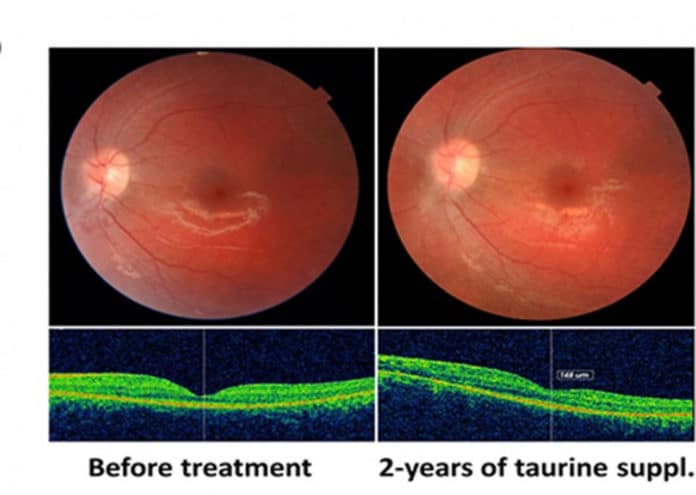Our genome comprises of 20,000 genes, which may all be capable of activating infection. It is assessed that 7,000 unknown genes cause recessive genetic diseases coming about because of changes in two copies of a gene that have been acquired from each parent.
Scientists at the University of Geneva (UNIGE), Switzerland, have recently identified 45 new genes that cause blindness or cognitive problems. The scientists specifically focused on the SLC6A6 gene, which encodes a transporter protein that conveys an amino acid essential for the working of the retina and cardiac muscle: taurine.
When there are pathogenic changes of the SLC6A6 gene, an individual will experience the ill effects of an absence of taurine and will gradually lose his sight until he becomes blind inside a couple of years and builds a weak heart.
The geneticists at the University of Geneva hypothesized that a taurine supplement might make it possible to compensate for this deficiency. The supplement was given to a young girl suffering from the disease to help stop the progression of her visual degeneration and to treat her cardiomyopathy.
Scientists, in collaboration with scientists from Pakistan – studied the genomes of 500 Pakistani families who had ill and healthy children to identify as many genes as possible that cause these conditions. They identified Pakistani families because consanguineous marriage is still a common practice, with 50% of marriages taking place between first cousins.
Stylianos Antonarakis, emeritus professor in UNIGE’s Faculty of Medicine, said, “In fact, consanguinity increases the risk of developing a recessive genetic disease since about 12% of the genome is identical in cousins.”
One family was a source of particular interest to the researchers: the two parents – healthy first cousins – had four children, two of whom were sick: a 15-year-old boy, who lost all his sight in a few years, and a 4-year-old girl, who was gradually losing her sight but was still able to make out shapes and colors.
Muhammad Ansar, a researcher in the Genetics Department in UNIGE’s Faculty of Medicine, said, “With the help of the Khyber Medical University in Pakistan, we collected blood samples of each family member. Their genome sequencing showed that their illness was linked to a mutation of the SLC6A6 gene.”
“This gene produces a protein of the cell membrane that transports taurine, an amino acid that is especially important for the functioning of the retina and cardiac muscle.”
“It’s a dietary supplement found in large quantities in certain energy drinks. Patients suffering from the disease have deficient levels of taurine in their blood.”
After speculating the possibility of blocking the progression of the disease by administering taurine to the children, scientists brought the family to Geneva to conduct detailed investigations into this rare genetic disease. In addition to the progressive visual impairment, which was now unfortunately total in the case of the boy, the doctors diagnosed damage to the cardiac muscle in both children. The little girl, fortunately, still retained some residual vision.
Emmanuelle Ranza, a doctor and geneticist at University Hospitals Geneva (HUG) and UNIGE who was responsible for the clinical part of the study said, “We gave 100 mg per kg of taurine daily to the children to be continued over the long-term, and organized regular ophthalmologic and cardiac monitoring sessions in Pakistan.”
The outcomes immediately came to fruition: in three days, the taurine levels in their blood jumped from 6 to 85 μ mol/l, arriving at ordinary limits. Furthermore, following two years, the cardiomyopathy had vanished in both kids! What’s more, the degeneration in the young girl’s sight was brought to a halt, and there was even an improvement, which means she could move around independent from anyone else. Lamentably, this advancement was unrealistic for the kid, who had just lost his whole retina.
Antonarakis said, “These results are exceptional because it’s the first time a food supplement given orally has been used to treat the retina and the heart successfully.”
“This little girl has paved the way for a potential cure for new-borns suffering from the same recessive disease. One patient can change the history of medicine!”
“Our goal now is to detect new-borns affected by the condition at an early stage so they can be treated from birth with a taurine supplement and potentially prevent the onset of symptoms.”
The study is published in the journal Human Molecular Genetics.
